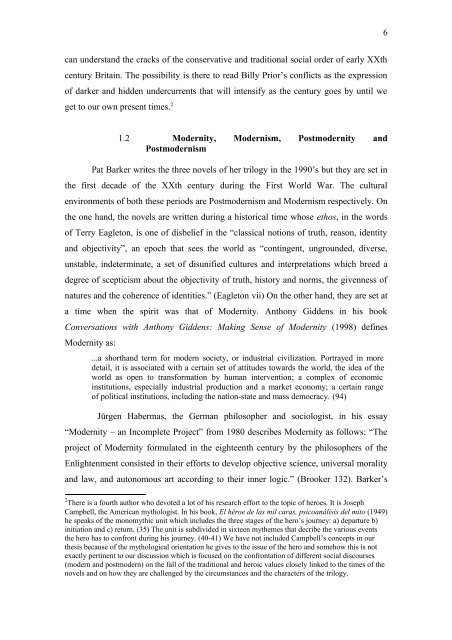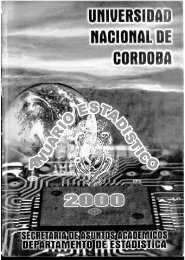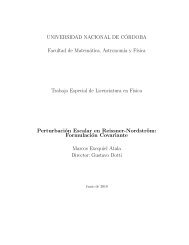Chapter I - RDU - Universidad Nacional de Córdoba
Chapter I - RDU - Universidad Nacional de Córdoba
Chapter I - RDU - Universidad Nacional de Córdoba
You also want an ePaper? Increase the reach of your titles
YUMPU automatically turns print PDFs into web optimized ePapers that Google loves.
6can un<strong>de</strong>rstand the cracks of the conservative and traditional social or<strong>de</strong>r of early XXthcentury Britain. The possibility is there to read Billy Prior’s conflicts as the expressionof darker and hid<strong>de</strong>n un<strong>de</strong>rcurrents that will intensify as the century goes by until weget to our own present times. 21.2 Mo<strong>de</strong>rnity, Mo<strong>de</strong>rnism, Postmo<strong>de</strong>rnity andPostmo<strong>de</strong>rnismPat Barker writes the three novels of her trilogy in the 1990’s but they are set inthe first <strong>de</strong>ca<strong>de</strong> of the XXth century during the First World War. The culturalenvironments of both these periods are Postmo<strong>de</strong>rnism and Mo<strong>de</strong>rnism respectively. Onthe one hand, the novels are written during a historical time whose ethos, in the wordsof Terry Eagleton, is one of disbelief in the “classical notions of truth, reason, i<strong>de</strong>ntityand objectivity”, an epoch that sees the world as “contingent, ungroun<strong>de</strong>d, diverse,unstable, in<strong>de</strong>terminate, a set of disunified cultures and interpretations which breed a<strong>de</strong>gree of scepticism about the objectivity of truth, history and norms, the givenness ofnatures and the coherence of i<strong>de</strong>ntities.” (Eagleton vii) On the other hand, they are set ata time when the spirit was that of Mo<strong>de</strong>rnity. Anthony Gid<strong>de</strong>ns in his bookConversations with Anthony Gid<strong>de</strong>ns: Making Sense of Mo<strong>de</strong>rnity (1998) <strong>de</strong>finesMo<strong>de</strong>rnity as:...a shorthand term for mo<strong>de</strong>rn society, or industrial civilization. Portrayed in more<strong>de</strong>tail, it is associated with a certain set of attitu<strong>de</strong>s towards the world, the i<strong>de</strong>a of theworld as open to transformation by human intervention; a complex of economicinstitutions, especially industrial production and a market economy; a certain rangeof political institutions, including the nation-state and mass <strong>de</strong>mocracy. (94)Jürgen Habermas, the German philosopher and sociologist, in his essay“Mo<strong>de</strong>rnity – an Incomplete Project” from 1980 <strong>de</strong>scribes Mo<strong>de</strong>rnity as follows: “Theproject of Mo<strong>de</strong>rnity formulated in the eighteenth century by the philosophers of theEnlightenment consisted in their efforts to <strong>de</strong>velop objective science, universal moralityand law, and autonomous art according to their inner logic.” (Brooker 132). Barker’s2 There is a fourth author who <strong>de</strong>voted a lot of his research effort to the topic of heroes. It is JosephCampbell, the American mythologist. In his book, El héroe <strong>de</strong> las mil caras, psicoanálisis <strong>de</strong>l mito (1949)he speaks of the monomythic unit which inclu<strong>de</strong>s the three stages of the hero’s journey: a) <strong>de</strong>parture b)initiation and c) return. (35) The unit is subdivi<strong>de</strong>d in sixteen mythemes that <strong>de</strong>cribe the various eventsthe hero has to confront during his journey. (40-41) We have not inclu<strong>de</strong>d Campbell’s concepts in ourthesis because of the mythological orientation he gives to the issue of the hero and somehow this is notexactly pertinent to our discussion which is focused on the confrontation of different social discourses(mo<strong>de</strong>rn and postmo<strong>de</strong>rn) on the fall of the traditional and heroic values closely linked to the times of thenovels and on how they are challenged by the circumstances and the characters of the trilogy.
















